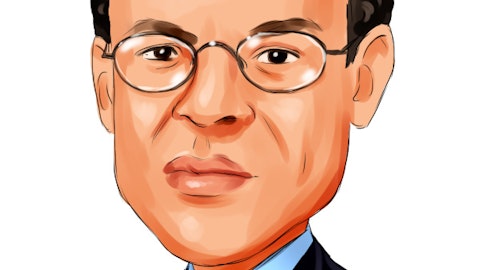Operator: And we will move to our next question from Manan Gosalia with Morgan Stanley.
Manan Gosalia: Hey. Good afternoon. You noted that the average transaction fees were lower this quarter. Is there anything specific driving that? Is it just a lower size of deals? Is it more competition? Can you talk about how we should think about that going forward?
Lindsey Alley: I think it’s hard to think about it going forward. It is really going to be a little random quarter-by-quarter. We kind of think about average transaction fee on an annual basis, and I’d say, if you look back over the last 15 years, we have pretty consistently increased our average transaction fees over that time period. It’s just sometimes in the quarter, you will have swings based on size. I’d say, there was no store here at all and you will unfortunately continue to see some swings quarter-by-quarter, but the long-term trend is obvious if you look at the numbers.
Manan Gosalia: Great. And you also spoke about the pent-up demand in M&A. So is it really just the financing market that’s holding things back? Can you talk about what you are hearing from clients as we get closer to the Fed maybe stopping their rate hikes and how — where buy and sell expectations on the bid ask right now?
Scott Beiser: Yeah. I think it’s a combination, interest rates and financing availability is one thing, where people think the economy is going, where a company’s near-term earnings, expectations are different people’s views on valuations, all of that is impacting the decisions and the speed of which people are able and willing to close transactions.
Manan Gosalia: Got it. Thank you.
Operator: And we will move on to our next question W . Matt , your line is open.
Unidentified Analyst: I am sorry.
Operator: Please go ahead, Matt.
Unidentified Analyst: Hi. I think you cut out there for a second, but I believe I was called here. Good afternoon, guys.
Scott Beiser: Hi, Matt.
Unidentified Analyst: I just have one on the Restructuring cycle. Hi. How is going? Just last quarter you expressed some optimism overall that this Restructuring cycle could be elevated for what feels like a prolonged period of time. Just wanted to take your pulse on that, just kind of given where that the sentiment stands today, just given that there’s been maybe some shifting of expectations for maybe a soft landing more recently? And I guess even from like a headline standpoint, I think, a lot of the large activity you have seen at least from news flows related to the crypto space. But curious in terms of what impacts you guys, what you are seeing as challenged areas in industry verticals and regions that more directly impact Houlihan?
Scott Beiser: So, overall, I’d say, we are more optimistic on what we see going forward with Restructuring than we were a quarter or two quarters ago as it just continues to build. I’d say, if you think of it as kind of a water spigot. It just keeps opening up a little bit more and more, it’s not fully open and we don’t expect to see a full flush out like we saw maybe in Spring of 2020 or the Great Recession of 2008, but it is a kind of a full-fledged increased Restructuring environment globally. So not only in the United States, Western Europe and Asia, but really almost all other parts of the world and it’s impacting a whole litany of industries. I don’t think there is a particular leading industry. Crypto, which has obviously gotten some news, but it’s just one of many, many pieces out there and we continue to see a build of our business and whether it’s on the debtor side or credit or side, U.S. or outside of the U.S. among a variety of different industries.





